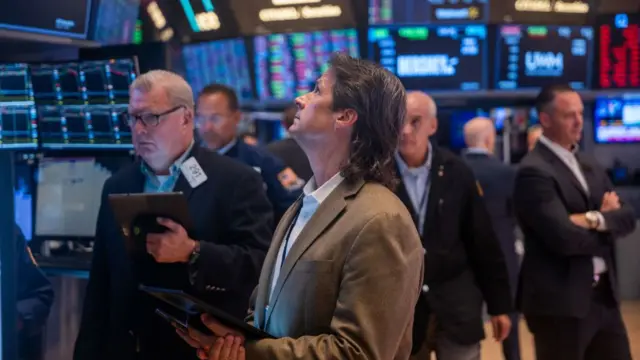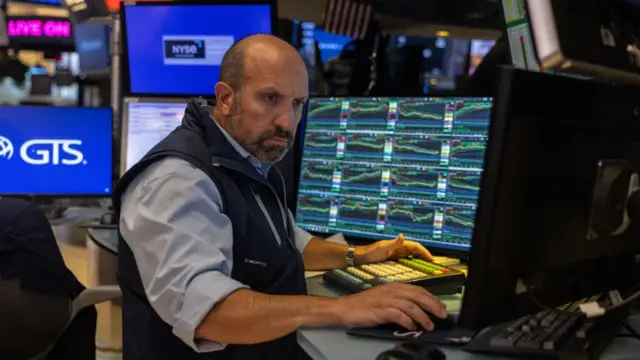
Prelude to Market Volatility
Global financial markets have been severely shaken by a series of escalating events that have triggered widespread investor anxiety and significant fluctuations in major stock indices. The turbulence began following changes in monetary policy and unsettling economic data from major economies, compounded by geopolitical tensions.
Market Downturn Triggered by Monetary Policy Shifts
One major catalyst was the unraveling of the Japanese yen carry trade. The yen carry trade, which had been a popular investment strategy, collapsed when the Bank of Japan (BoJ) raised interest rates for the second time in the year, thereby strengthening the yen. This move disrupted investors who had borrowed yen to invest in higher-yielding assets[1][4]. Speculators had to unwind their positions, leading to a selloff in global financial markets.
Impact on Major Stock Indices
The repercussions were swift and severe. On a single day, the Japanese Nikkei 225 index plummeted by over 12%, marking its worst performance since Black Monday in 1987[1][4][5]. The U.S. markets were also hit hard. The S&P 500 index saw its worst day since the 2022 bear market, losing more than 3% and shedding $1.3 trillion in value[4]. Concurrently, the Dow Jones Industrial Average dropped over 1,000 points, and the Nasdaq Composite entered deeper into correction territory[1].
Broader Global Market Reaction

The fear translation wasn't confined to the United States and Japan. Stock markets across Asia, including Taiwan, South Korea, India, Australia, Hong Kong, and Shanghai, all tumbled[2]. European markets also took a hit, with France's Cac 40, the UK's FTSE 100, and Germany's Dax down by as much as 2%[2][4].
Investor anxiety was further exacerbated by a disappointing labor report from the U.S., which showed that only 114,000 jobs were added in July, far below economists' expectations. This triggered fears about the health of the U.S. economy and raised concerns about a potential recession[1][2]. The consequent rise in the unemployment rate to 4.3% stoked further fears, triggering what's known as the Sahm rule—a technical indicator suggesting the U.S. might be at the onset of a recession[1][2][4].
Analysis from Financial Experts

Analysts and economists have offered various interpretations of the ongoing market turbulence. According to the BBC, experts like Katy Kaminski, Chief Research Strategist at AlphaSimplex, noted that while inflation was initially a concern, the prevailing fears have shifted towards economic weakness. She underscored that economic uncertainty, political instability, and high equity valuations could trigger a market correction[2].
Goldman Sachs, in their report, emphasized that while there are no imminent risks of a U.S. recession, market pricing already reflects a soft landing scenario—with the possibility of higher rates for a longer duration causing ongoing stress for some sectors[5]. They noted that the resilience of risk and carry assets indicates that valuations are not especially compelling, suggesting modest positive returns under their central case for equities, credit, and bonds in 2024[5].
Reactions and Statements from Market Players

High-profile market players like Warren Buffett have also been referenced amid the turmoil. Bloomberg reported that Buffett sold a significant portion of Berkshire Hathaway's stake in Apple, which contributed to market nervousness, though experts believe this is more about profit-taking than a fundamental shift in market dynamics[4]. Additionally, AI investments and earnings have failed to live up to inflated expectations, further contributing to the selloff in tech stocks[4].
Central Bank Actions and Market Sentiment
Central banks' actions have been pivotal during this period. The Federal Reserve, Bank of England, and Bank of Japan have all been adjusting their rate policies, albeit in a seemingly uncoordinated manner. This lack of coordination among major central banks has increased the risk of a market accident, according to Bloomberg columnist John Authers[4]. Actions by these banks—increasing, decreasing, or maintaining interest rates—have contributed to a volatile environment.
Equity Market Strategies Moving Forward

The financial advisory site AM highlighted a cautious outlook for equities for the rest of the year. They suggest reducing exposure to equities amidst slowing economic growth and uncertainty around the U.S. presidential election. The AM report recommends increasing cash positions and remaining neutral on bonds due to the view that the global economy might avoid a recession, though political and economic uncertainties remain high[3].
Conclusion
The recent market upheaval demonstrates the interconnectedness of global financial systems, where changes in one country's monetary policy can have far-reaching implications. Amid this backdrop, investors are urged to remain cautious, diversify their portfolios, and stay informed about central banks' actions and geopolitical developments to navigate the prevailing uncertainty. Expert insights and market strategies aim to mitigate risk in an environment where economic data, political events, and investor sentiment continue to drive market behavior[1][2][3][4][5].
Get more accurate answers with Super Pandi, upload files, personalized discovery feed, save searches and contribute to the PandiPedia.
Let's look at alternatives:
- Modify the query.
- Start a new thread.
- Remove sources (if manually added).